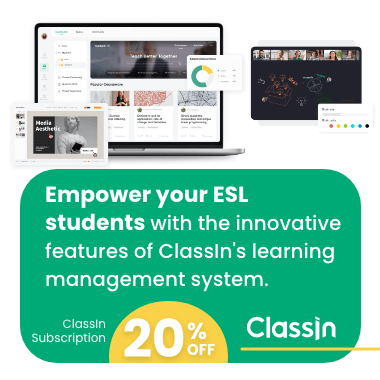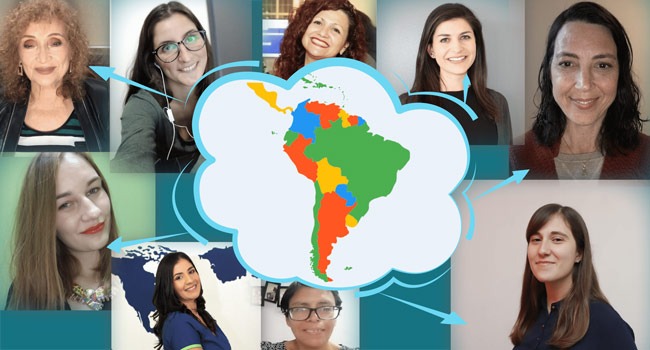Due to the COVID-19 pandemic, many English language teachers (ELTs) lost work and had to make significant cuts in their personal and professional lives, including in their own education. To help global ELTs meet the challenges of these pandemic-related shifts, Bridge Education Group, supported by a YLAI Fellowship Program Collaboration Grant, created the English Teacher Empowerment Scholarship. Recipients of this opportunity got to continue their professional development through Bridge workshops and teacher-training programs at no cost.
“Bridge’s mission is to empower English teachers around the globe. We’re proud the scholarship reflects this and gave us another opportunity to support teachers.”
Karyssa Cox, director of marketing operations at Bridge, explains that the idea for the scholarship was conceived as a result of Bridge’s participation in the Young Leaders of the Americas Initiative (YLAI) Fellowship Program, an initiative of the U.S. Department of State to support entrepreneurs throughout the Americas with resources and professional development opportunities. After Bridge hosted YLAI Fellows Josefina Castillo from Argentina and Raquel Castro from Costa Rica in April of this year, the plan for a scholarship to reach even more teachers was created.
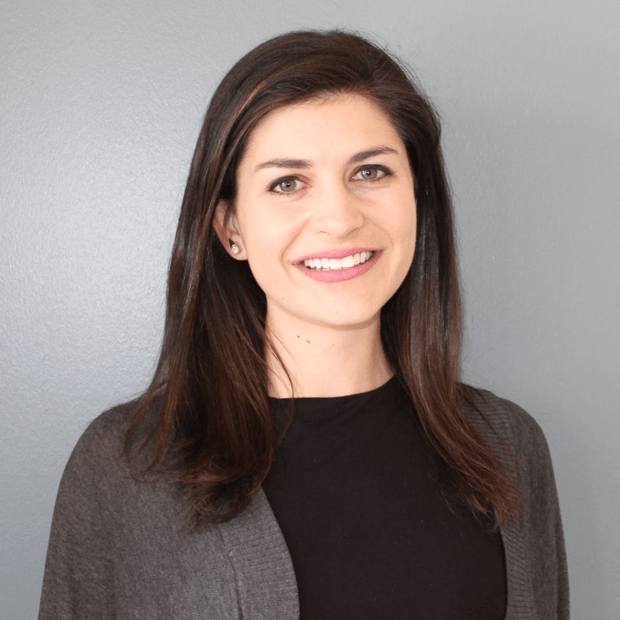
“Raquel, Josefina and I developed the scholarship as a way to support teachers in Argentina and Costa Rica by helping them address some of the challenges that COVID-19 brought, particularly the move to online and hybrid classrooms,” Cox explains. “The scholarship grants enrollment in four Bridge professional development courses which focus on teaching English online as well as teaching young learners and teenagers. We were very excited to be awarded a YLAI Collaboration Grant that allowed us to launch the project!”
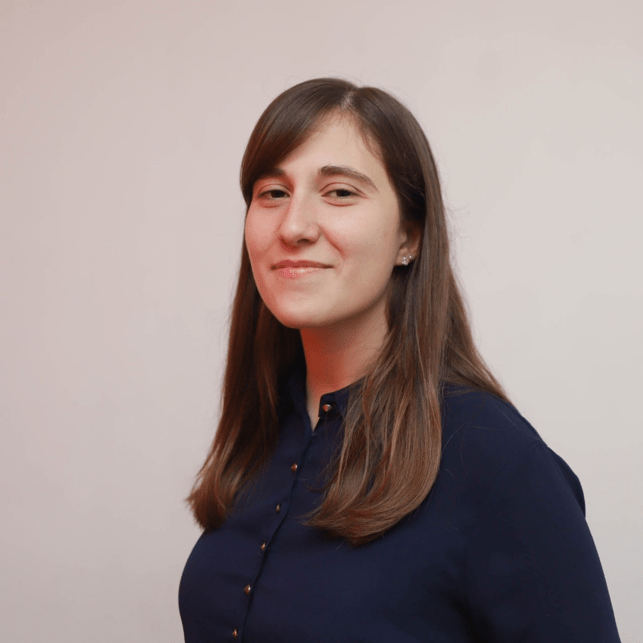
Castillo says that upon having the opportunity to work with Bridge, she wanted to help other teachers expand their knowledge in ways that could create greater impact, both for them and their students. Along with Cox and Castro, she evaluated each applicant’s statement of interest, financial need, the impact they would have on their community, and the importance this educational opportunity would have in their lives. The goal of the program was to empower and motivate scholarship recipients to become the best versions of themselves and give back to their communities.
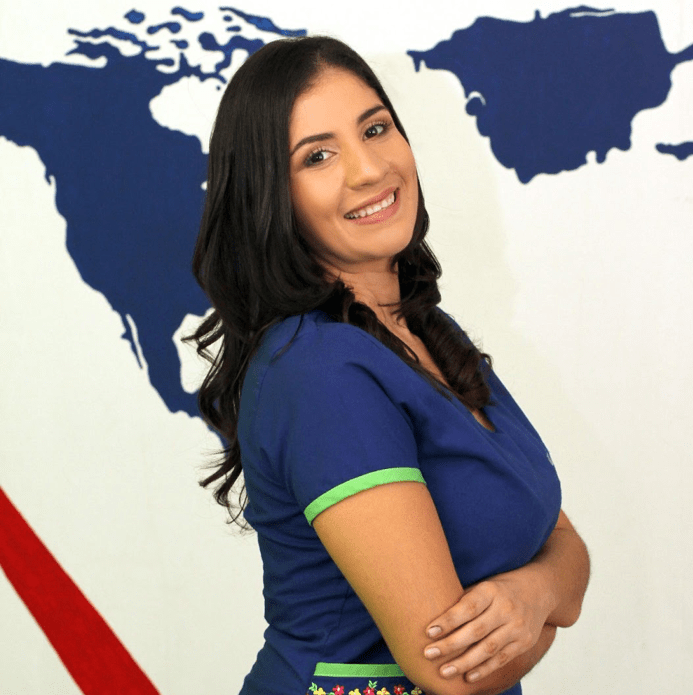
To be eligible, applicants had to be at least 18 years old, have an English teaching degree or at least two years of experience as an English language teacher, reside in Argentina or Costa Rica, have a demonstrated financial need, and have an upper-intermediate or higher level of English proficiency.
The Scholarship Recipients

Ana Vagni Jajam from Argentina was a year into studying to become a translator when she decided that the work would be too lonely for her and wouldn’t allow for much creativity, so she switched courses to become a teacher. She has now been teaching English for more than 25 years and next year, she plans to relocate to Spain. She holds a degree equivalent to a BA in TESOL as well as a BA in linguistics.
“I strongly believe I would be able to raise awareness of the importance of learning the English language and to help improve teachers’ English proficiency and teaching methodologies in Argentina and the rest of Latin America.”
To Vagni Jajam, teaching English means giving students the tools to succeed in a globalized world while imparting values like respect for diversity, democracy and appreciation of one’s own culture. In addition, she believes that teaching English can empower students to communicate their views and culture with others, learn about other people’s perspectives, gain a greater understanding of the world and broaden their horizons.
Dannia Menzies Bolandi from Costa Rica is TEFL/TESOL-certified and has been an English language teacher for two years. She decided to become a teacher to help public school children in Costa Rica learn how to use English at a conversational level. In line with this, she is committed to giving back to society by providing students educational resources to help them have a better future.
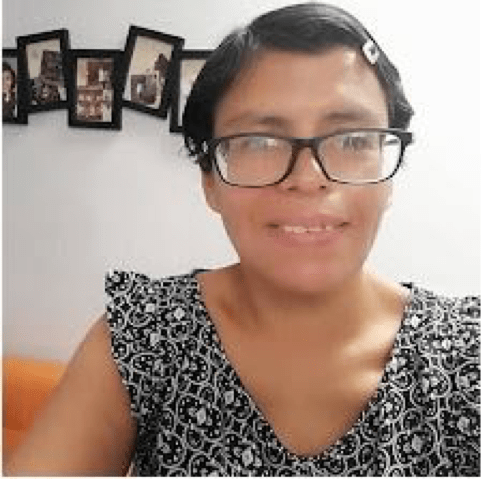
She loves teaching, sharing her knowledge, and getting to know her students and says that showing interest in her students’ learning needs has been a great way to build community and establish meaningful connections. “I think that the ability to teach comes from your heart; it’s something you embrace because you know that you are helping others achieve their goals,” she explains.
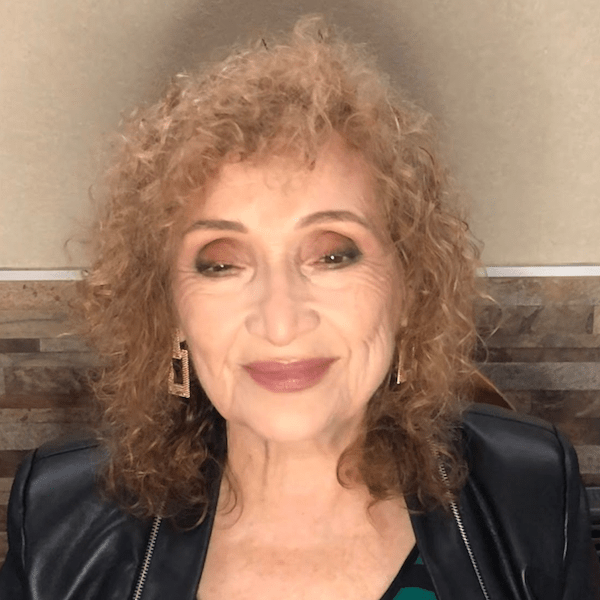
Ana María del Valle Castro is from Argentina and has been an English language teacher for 30 years. She was born and raised in La Rioja, a small province in the country’s northwest, where she says access to education wasn’t a given. However, her parents dreamt of her and her five siblings enrolling in higher education and thus worked hard to support her financially throughout her years at university. To del Valle Castro, teaching is a profession, a passion and a way to help people overcome poverty. She explains, “education is a way out; it’s a solution for vast portions of society in the lower strata. Poverty can only be solved through education.”
As the child of a primary school principal and the grandchild of a teacher, the importance of education was instilled in her early on. “The passion for education was almost a patriotic spirit uniting everybody,” she says. She recounts the revolutionary public policies of Argentina’s former President Domingo Faustino Sarmiento, who, in the late 19th century, brought American teachers to various schools in Argentina to improve and foster education. As a result, literacy rates went up dramatically, something she looks back on as an inspiration.
Gisella Peschi from Argentina has been an English language teacher for 12 years. Starting her career as a private teacher, she shifted to working in a primary school six years ago. From early childhood, she wanted to become a teacher. As a teenager, she taught lessons for the local boy scouts and at Sunday school and realized that teaching was a way to connect with people and help them grow. Due to her natural knack for learning foreign languages, she decided to study English, which she considers the bridge connecting people and cultures.
To Peschi, teaching can touch and transform lives. She explains, “It is not only about transmitting knowledge but about leaving a positive mark on every student that is in your class.” She finds that commitment and passion are the keys to encouraging students to learn a new language and enjoy it. She strives to forge strong bonds with her students through empathy and compassion, while being sensitive to their needs.
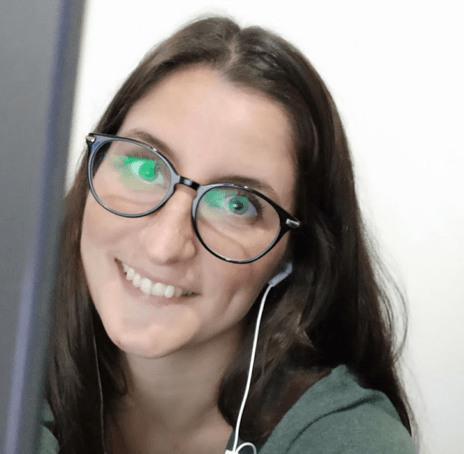
Gisela Vilares from Argentina has been teaching since 2013. Before she earned her degree, she tutored children, helping them with language learning to pass their subjects in school. Today, she works at G&R English Institute, where she teaches nine different groups and levels of teenagers and young professionals. Vilares has always enjoyed traveling, learning about cultures, and getting to know different people and languages, and finds that English has allowed her to experience all those things. In addition, teaching English has been an open door to the world, to the internet, and employment opportunities – for herself and her students.
Vilares describes herself as a professional who seeks to strengthen and promote students’ intellectual, physical, affective, moral and social development. She aims to give her students the tools to build their learning collaboratively by cultivating the basic cultural competencies of communication, critical thinking, problem-solving and participation. She constantly looks for ways to improve her teaching methods and create stimulating environments that motivate her students to participate and thrive in their learning.
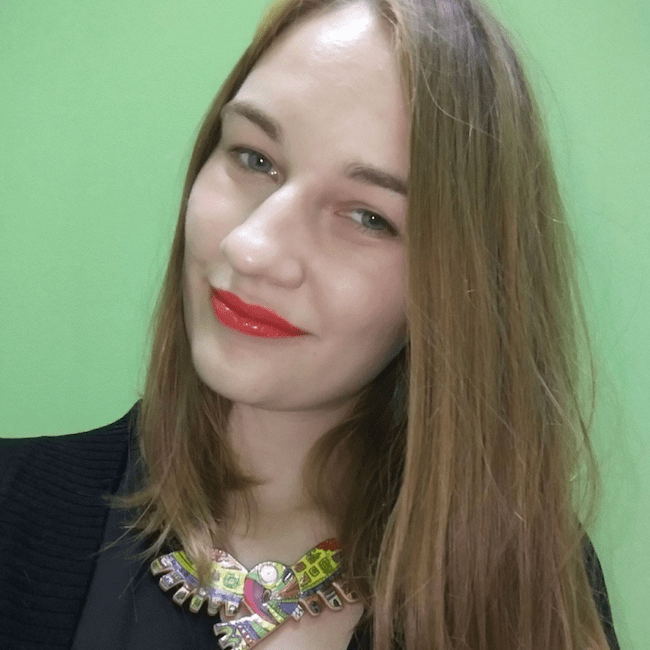
Anastasia Sokolova lives in Argentina. At the onset of her career, she combined teaching English with other language-related jobs. She explains that she wanted to feel confident in her language abilities before teaching English full-time. Now, she has been a teacher for the past five years, a choice she doesn’t regret. She currently works as a private tutor as well as for an online language school.
“My goal in life is to continue developing my professionalism and multiculturalism to be able to inspire students, dreamers, and future generations to do the same.”
Being proficient in English has had a significant impact on her life, and today she wants to pass on that impact to her students. From work opportunities and the ability to travel independently, to meeting fascinating people and having free access to information that otherwise wouldn’t have been available to her, fluency in English has opened many doors and transformed her life. She especially sees the impact that English teaching has on children. “What children learn from me can drastically affect their worldview, the opportunities they will have and their future life choices,” she says.
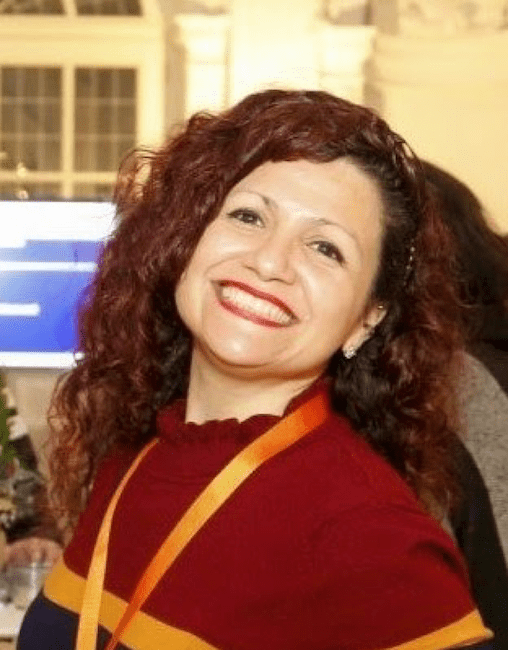
Andrea Beatriz Collados, originally from Argentina, has been teaching English as a second and foreign language for more than 20 years. She currently lives in Germany but will be returning to Argentina this month. Her career has included teaching for state schools, private language centers and universities. She has worked in many different countries, including the US, Andorra, China, Japan, Sudan and Germany. She is currently a substitute teacher at the Franconian International School in Germany and an online English instructor teaching students from Latin America. To Collados, teaching English is a way to impart knowledge and motivate students to make the right decisions in life. As a universal language, she believes English is a powerful tool that enhances communication and connects individuals and communities, on the internet and in real life, for personal and professional purposes. It bridges cultures and helps young learners develop critical and creative thinking while preparing them to enter international communities and work with others globally. “My goal in life is to continue developing my professionalism and multiculturalism to be able to inspire students, dreamers, and future generations to do the same,” she says.
Continuing Professional Development
“We wanted recipients who are passionate about teaching and who believe in the ability of teachers to make a difference in students’ lives. We also wanted recipients who understand the importance of ongoing professional development in their teaching careers and who could articulate a strong plan of how they would take what they learned and apply it in their work and community.”
“I want to achieve excellence!” says Ana María del Valle Castro, explaining why she applied to the English Teacher Empowerment Scholarship. She had found out about the opportunity online and felt confident that she had a chance of being named one of the recipients. Upon finding out that she, indeed, had been selected, she says she cried out enthusiastically, “just like I did when I was a teenager.”
According to Cox, there were several considerations when choosing scholarship recipients. “One of the key factors we looked at was what the recipients felt the role of English education is and how they saw their own role as teachers,” she explains. “We wanted recipients who are passionate about teaching and who believe in the ability of teachers to make a difference in students’ lives. We also wanted recipients who understand the importance of ongoing professional development in their teaching careers and who could articulate a strong plan of how they would take what they learned and apply it in their work and community.”
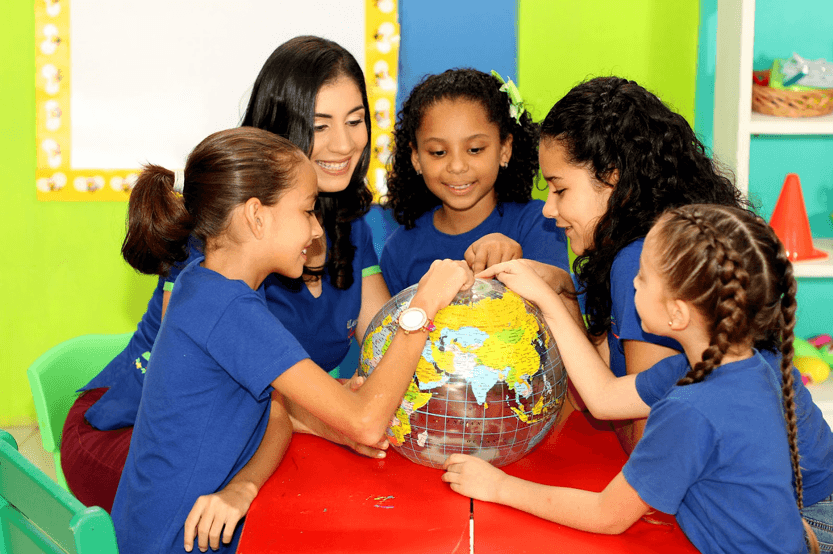
Ana Vagni Jajam, Dannia Menzies Bolandi, and Andrea Beatriz Collados found out about the scholarship on Facebook. Anastasia Sokolova also found the scholarship online, but by checking Bridge Education Group for opportunities. She says that she had planned to pursue continuing professional development (CPD) for a while, but pandemic-related issues made it impossible for her to afford any programs. After applying to the English Teacher Empowerment Scholarship, she was unsure about her chances. “I was sure I wouldn’t be selected,” she said, “especially when the announcement of the results got delayed a little, but it never hurts to try, so I’m glad that I did apply.” Similarly, Gisela Vilares knew that she wanted to advance her knowledge and skills to teach online but lacked the funds to attend professional development courses. Although she applied for the scholarship, she did not expect to hear back and jumped out of her chair, screaming “I was selected!” to her husband upon finding out.
Gisella Peschi was excited when she discovered the scholarship and knew it could help her further develop her skills while learning from fellow teachers. To her, the opportunity seemed “too good to be true.” She says, “When I was notified that I got the scholarship I was thrilled! I could not wait to start the courses as soon as possible.”
Keen to make a career change, Vagni Jajam applied to the scholarship program. Happy that she was selected as a recipient, she believes the scholarship will add value to her resume. Bolandi hopes the knowledge gained in the program will allow her to become a more efficient teacher and reach out to more students to help them grow. She views the scholarship as an excellent opportunity to learn, acquire new skills and improve her teaching.
Collados considers herself a lifelong learner and quotes authors Silvana Richardson and Gabriel Diaz Maggioli to explain her decision to apply for the scholarship. “The main goal of CPD is to effect changes in teaching so that it results in enhanced student learning,” she says. Amidst COVID-19, she found the scholarship opportunity to be timely, and one she could leverage to enhance her online teaching skills. Thrilled to find out that she was selected as a scholarship recipient, she plans to use what she learns to significantly impact her community and the rest of Latin America once she moves back home to Argentina. She says, “undoubtedly, this scholarship will greatly benefit my professional and my personal life because it will be an excellent way to enrich and boost my teaching career while meeting like-minded people from diverse educational backgrounds through the global community and employer network. Also, it can open up more and better opportunities in the ELT world.”
Impacting Local Communities
Equipped with valuable lessons from Bridge online teacher professional development courses, all scholarship recipients have goals to impact their local communities. For example, Bolandi believes that life is about giving back, impacting someone’s life, and contributing to a better world. “I know that there are many NGOs in Costa Rica that need teachers to help students with extra English lessons,” she says. In line with this, she already gives free lessons to a few students who cannot afford English classes. Sokolova also plans to give back by volunteering as a teacher in Argentina, preferably for children, to help improve their chances for future opportunities.
Vagni Jajam is registered at MyCoolClass, a cooperative of online teachers where she plans to offer a virtual classroom to students from all around the world as well as get involved in the development of teaching materials. “When I complete the scholarship, I plan to offer English lessons to speakers of other languages. I want to help them advance their careers, study abroad, make friends from around the world and use English for travel or for business,” she says. As part of her commitment to giving back, del Valle Castro has contacted two organizations that work with people and children in underprivileged areas and plans to volunteer with them.
In addition to applying what she learns in future classes for the benefit of her students, Peschi also plans to share her knowledge with colleagues to help them grow. “It’s like a chain,” she says. ”If a teacher keeps learning and growing, their students will do so as well,” she says. Vilares and Collados agree. Because Argentina lacks continuing professional teacher training, Vilares says she wants to use what she learns to help both students and fellow teachers. Collados adds, “I strongly believe I would be able to raise awareness of the importance of learning the English language and to help improve teachers’ English proficiency and teaching methodologies in Argentina and the rest of Latin America.” Upon completing the scholarship courses, she plans to use her newly acquired experiences, skills and knowledge to promote English as a means to connect cultures.
Navigating a New Normal
The COVID-19 pandemic upended lives worldwide; it changed the way we work, study, communicate and navigate each day. For students, the most significant change was a switch to online learning, which largely depended on internet and computer access.
Collados says that students had to face many challenges by switching to online learning. For example, they struggled with issues like becoming familiar with new programs and platforms, not having the appropriate equipment, or lacking a comfortable environment (she explains that some students would attend lessons during working hours in noisy rooms), and coping with connectivity problems.
Bolandi says, “In Costa Rica, the pandemic affected many students, especially those who live in rural areas, due to a lack of access to technology.” The same holds for Argentina. According to Vagni Jajam, the pandemic increased inequality in Argentinian schools. “Students without access to a computer found themselves outside of the education system, while students in private schools could continue learning online,” she explains. Peschi adds that the complete closure of state schools and insufficient internet access caused a gap in many students’ education in Argentina. As a result, they may have lost a year of education which cannot be made up.
Del Valle Castro says that some students would connect to online classes through the only cell phone available in their household, at the expense of other family members’ needs. She adds that many children could not return to in-person classes once schools reopened because they couldn’t afford public transportation after their parents lost their jobs due to the pandemic. This, she believes, in addition to malnutrition and mental health challenges many teachers noticed in students, will have to be addressed.
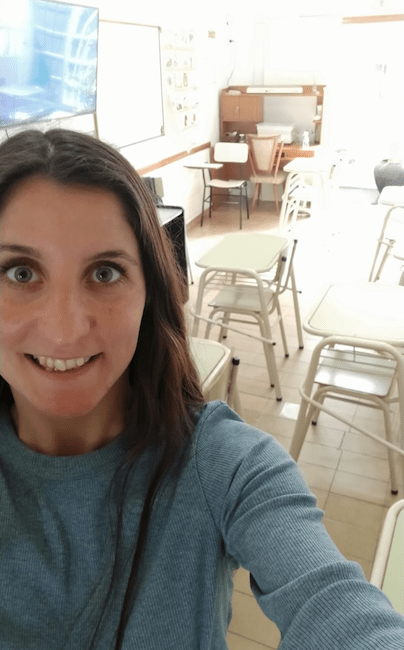
Vilares looks at the switch to online learning in a more positive light, saying “We gradually started to love online classes and found a way to have fun even at a distance. The learning process was hardly affected because we were motivated. Humans can adapt to all situations, so that’s what we did: we adapted and moved forward.” Peschi adds that, at some point, teaching online became more comfortable because of a reduced number of students and the opportunity to provide more individualized teaching by allowing each student to share and be heard.
This new normal affected the scholarship recipients’ personal and professional lives in different ways. To some of the recipients, local lockdowns offered a way to stand still and evaluate their priorities, careers and lives. “The pandemic had a surprisingly good effect on my work because I had more time to think about my priorities and what I really want to do in my teaching career. Not having to travel to work was also a huge relief!” says Vagni Jajam. Before the onset of the pandemic, Sokolova mostly lived a nomadic lifestyle. However, as coronavirus lockdowns started, she stayed in Argentina, which turned out to be a positive experience. “I’m grateful for how I was received in this country, and I hope I can do some good work here in return,” she says.
“I think online teaching has definitely come to stay, so I think we can expect most of the teaching in the future to happen remotely.”
Collados calls the pandemic a bittersweet experience. “When the pandemic started I was in Argentina on holiday so I got stranded there for five months because the borders were closed,” she says. She recounts how she struggled financially due to not attending to her work in Germany, where she continued to pay rent without any income or pandemic-related financial assistance from the German government. “On the other hand,” she says, “spending the first five months of the pandemic with my family and in my home country was the best thing of 2020. Dealing with such a unique and harsh situation surrounded by the people I love and feeling sheltered by my own community made that experience less traumatic, and I think that is priceless.”
Whatever changes the global pandemic has brought, one thing seems to be certain to all the scholarship recipients: blended teaching and learning methods are here to stay. “The pandemic is going to be over sooner or later, but the effects will be that English teaching will incorporate more blended methods that combine face-to-face with distant teaching,” says Vagni Jajam. And Sokolova adds, “I think online teaching has definitely come to stay, so I think we can expect most of the teaching in the future to happen remotely.”
The Way Forward
Collados believes that the future of learning will rely on a hybrid model of online and in-person learning. While she thinks students can benefit from online instruction, which allows them to study at their own pace and place, she emphasizes the importance of in-person interaction as the key to effective learning. In general, she predicts that demand for quality teachers across the region will continue to grow and that a blend of synchronous, asynchronous and brick-and-mortar learning will greatly benefit education overall.
As for her personal life, Collados plan to move back home to Argentina to settle down, open up a language school, and offer language exchange programs and other services after more than sixteen years of teaching abroad. In the future, she also hopes to open a non-governmental organization that would focus on improving educational levels in her community.
Peschi is sure that the ESL industry will continue to grow as people understand and realize that English is key to developing their professional careers and getting better opportunities. “In my view, English is the global language, so people will need to learn it if they want to be part of this globalized world,” she explains. “My future plan as an ELT is to keep connecting cultures, to learn from my students and to know the world through them, apart from imparting knowledge, values and principles.”
While Vagni Jajam wants to continue teaching, she also hopes to create online courses on subjects such as history, intercultural literature and sociolinguistics of English-speaking countries. Bolandi also intends to continue one-on-one teaching and develop group learning activities to help students improve their language skills through conversation. She also plans to launch a podcast and volunteer in different organizations that offer assistance to students who cannot afford English classes.
“I am convinced that gaming is the right path. Kids understand and learn more easily through films and with songs, and even more with gaming.”
Vilares explains that in Argentina, English is not prioritized as it should be and hopes to see a change. “I would like English to be taught in state schools from kindergarten and not just from fourth grade,” she says. The knowledge is much better acquired at an early age, and the more exposure to the language the better. The progress and results will be in the end.” In addition, she says that she wants to continue developing her professional skills and teach not only students in her home country but also children and teenagers from all over the world.
Upon her impending retirement, del Valle Castro says she plans to work with underprivileged children by offering free courses that blend education with play. “I am convinced that gaming is the right path. Kids understand and learn more easily through films and with songs, and even more with gaming,” she says. After finishing her courses with Bridge Education Group, Sokolova plans to work more independently, focus on preparing students for international exams and volunteer as a teacher if possible.
As for the English Teacher Empowerment Scholarship, the program organizers hope it will positively impact this cohort as well as future recipients. Castillo sees the scholarship as a stepping stone to offering similar programs in the future and as a way to create a community of English teachers who help, motivate and empower one another. While the scholarship program was designed to support the communities from their home countries, Castro says she would love to be involved if it were extended to other countries. She expects the scholarship recipients to continue a chain of giving in their communities, impacting those most deserving. In addition, Castro believes that the recipients can contribute in small ways to changing the world through teaching English. Cox hopes so, too, adding, “Bridge’s mission is to empower English teachers around the globe. We’re proud the scholarship reflects this and gave us another opportunity to support teachers.”


